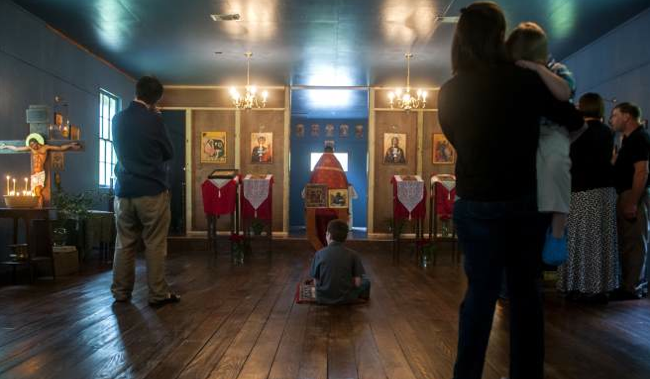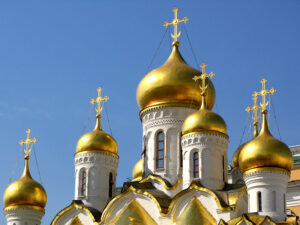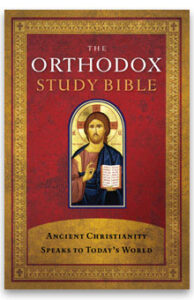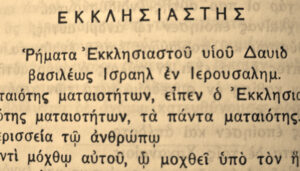Making the transition to Orthodoxy is often far from easy. Even if the inquirer comes to the conclusion that Orthodoxy is the true Faith, they may have family concerns that hold them back from taking the final step of converting to Orthodoxy.
I have included an excerpt from ‘C’ who expressed his concerns for his family spiritual wellbeing and Fr. Isaiah Gillette’s response to these concerns.

St. John Orthodox Mission in Starhill – West Feliciana parish, Louisiana Source: The Advocate
‘C’ wrote:
You asked what would I miss if I were to leave an evangelical church for Orthodoxy. The main thing is this.
Fr. Isaiah’s reponse:
A. Family focused ministry
I hear this phrase often used about evangelical churches. Too often what it means is that they split the family up for almost every activity, especially the most important activity, the Sunday morning worship service. I am a firm believer in the importance of Christian education: Sunday School, yes. Youth group, yes. Adult Bible study, yes. But it should not come as a substitute for attending worship together as a family. Here’s why:
1. The Divine Liturgy is by far the most important teaching tool for our faith. Even without a sermon, every vital truth of the Christian faith is there: the Holy Trinity, the Incarnation of the Word of God, the Cross, the Grave, the Resurrection, the descent of the Holy Spirit, and Christ’s eternal presence with us in the sacrament of Holy Communion. A good sermon is frosting on the cake.
2. Modeling. Children will never grow properly to a strong adult faith without seeing their parents pray and worship God. When children see and hear parents proclaiming the faith through the Nicene Creed, or singing “Lord, have mercy” sincerely, or going to the priest for confession, or making the sign of the Cross, they learn that this is important.
3. Simply put, even very young children know when there is something exciting going on, and they are being shuffled off to the nursery, “children’s church,” or whatever. “Let the children come to Him,” learn the hymns, smell the incense, cross themselves, help Mama bake communion bread. And don’t forget that your home is a “little church,” the place where children learn to bring the faith home and practice the lessons they learn at Church.
Do young children get antsy in worship? Of course! Take a book or a doll, or, better yet, help them get interested in what’s going on: “Look, here comes Father with the incense… Now we are going to stand up to hear the Gospel, because it is very important.” Etc.
If you still think your local Orthodox Church needs to do more for children, talk to your priest, and volunteer to get involved. There may already be more going on than you know. Most Orthodox Churches in the U.S. have a link to a Church-sponsored summer camp. Many of my fellow priests are the products of such camping ministries.
See: Antiochian Village (near Pittsburgh, PA) & Saint Nicholas Ranch (near Fresno, CA)
B. Feeling welcomed and pushed to love others
I have never attended an Orthodox Church where I did not feel welcomed. OK, maybe there have been a few people who were put off that I did not speak Greek, or Russian, or Arabic, or Serbian. But a smile and handshake usually breaks the ice. And showing a sincere interest in the Orthodox faith usually results in meeting people who are happy to share their traditions. There may be a few parishes where people are not used to others converting to the Orthodox faith, and wonder why you would go to all the effort. But most Orthodox in this country know people in their own parish who have made the leap – they are likely to be the first ones you meet.
Having said that, I can also say that I have never attended an Orthodox Church (or any other kind) where there was not someone who I did not get along with. There are just some personalities that are so different from mine that it is much more work to love them as I should. That’s where the “push” comes in; worshiping alongside “difficult” people (like me!) is our opportunity to lay down our own will out of love for our neighbor.
In any Orthodox Church, you will have plenty of opportunities to feel welcomed, and to be pushed to love others.
C. Feeling challenged in growth by the pastor
Here is another opportunity to talk with the local priest about your needs and hopes. Try to be open to the many ways that growth can take place. If you are coming from an evangelical background, you probably have a good exposure to the Bible. That’s great, bring it with you and let it grow, now fertilized by the Spirit-inspired teaching of the Church fathers. Listen to the words of the Divine Liturgy and other services of the Church. They are completely filled with Scripture.
The total burden for spiritual growth cannot rest on any one person, not even the most gifted and devout priest. He’s not going to preach for 30-40 minutes like your evangelical pastor (even though St. John Chrysostom and other early priests and bishops certainly did!). Keep reading! Get suggestions from your priest and fellow Orthodox Christians. Find out where the nearest monastery is, and visit as often as you can. This gives your children exposure to some real heroes of our faith.
I’m sorry to go on so long. I feel passionately about growing faith in families of our Orthodox Churches. This can be a most exciting and enriching environment in which to teach children to love Christ and others. Please let me know if there is any way I can be helpful to you on your journey. May God bless and lead you.
In Christ our Savior,
Fr. Isaiah Gillette






Recent Comments